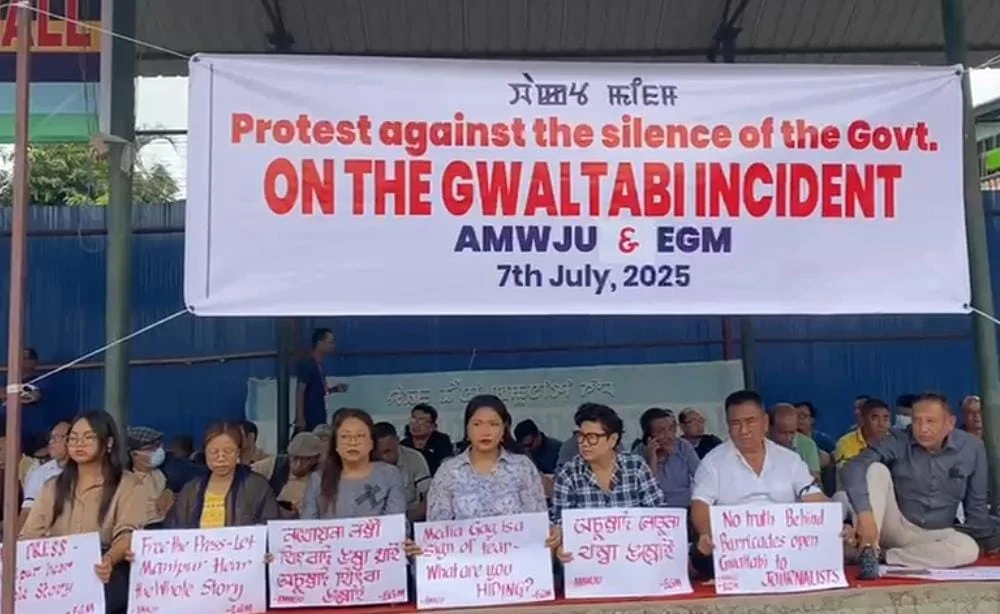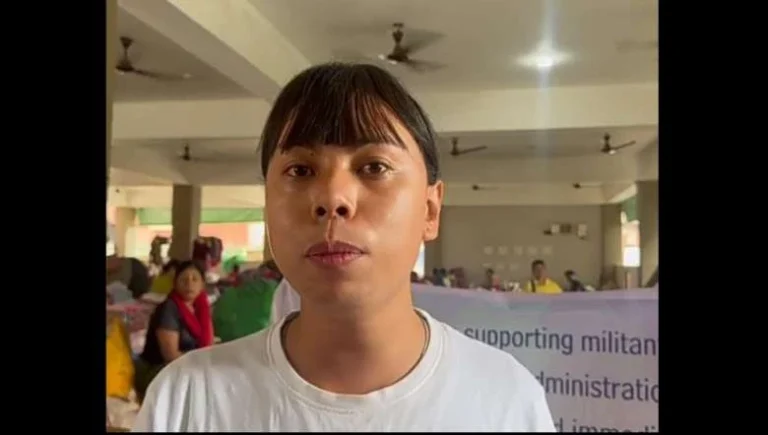Manipur Journalists Take a Stand: Sit-In Protest Over Gwaltabi Blockade
Short Summary
On May 20, 2025, journalists heading to Ukhrul to cover the Shirui Lily Festival in a government vehicle were blocked at Gwaltabi by security personnel, who demanded the word ‘Manipur’ be removed from the vehicle. Media unions, notably the All Manipur Working Journalists’ Union (AMWJU) and Editors’ Guild Manipur (EGM), condemned the act as a violation of press freedom. After forming a two-member probe committee whose report has yet to lead to any action, journalists staged a sit‑in protest on July 7, 2025, in Imphal to demand transparency and accountability from the state government
Introduction: When Reporting Becomes a Roadblock
Imagine heading out to cover a vibrant flower festival, only to be stopped at a checkpoint—not by protesters, but by the very forces meant to protect you. That’s exactly what happened at Gwaltabi, and it’s turned into a flashpoint in Manipur’s ongoing press-freedom struggle.
Read on to unpack how this single event reflects a larger clash between press freedom and government control—and why journalists in Manipur aren’t backing down.
1. The Roots: Festival Fever and Free Press
1.1 What Was the Shirui Lily Festival?
Every May, Ukhrul district bursts into color for the Shirui Lily Festival, named after a rare lily species native to the region. It’s a major cultural affair designed to promote ecotourism, featuring cultural programs, local cuisine, and vibrant performances
1.2 Role of Media
Journalists from across Manipur boarded a government-run bus—arranged specifically to cover the festival—and headed to Ukhrul. Officially, it was a state-backed mission. But some guards at Gwaltabi saw it differently.
2. Gwaltabi: Where Journalism Met Obstruction
2.1 What Happened?
At the Gwaltabi checkpoint under Litan Police Station jurisdiction, personnel from the 4 Mahar Regiment halted the bus. They demanded the removal or concealment of the “Manipur State Transport” label from the vehicle. It was clear: even the state’s identity was something to hide
Journalist unions branded this a blatant attack on press freedom—and a direct violation of the public’s right to know
2.2 Immediate Fallout
- Journalists aborted their coverage and returned to Imphal.
- On May 21, media outlets even launched a pen-down strike, halting publication to protest the harassment and make their voices heard
3. The Probe Committee: Words Without Action?
3.1 Formed But Silent
In response, the Governor of Manipur appointed a two-member inquiry team. Their mission? Investigate the facts and report swiftly. Their findings were reportedly submitted—but then… nothing. No arrests, no official statement, no clarity from the government .
3.2 Unrest Grows
Meanwhile, the Coordinating Committee on Manipur Integrity (COCOMI) began pushing for stronger action—including public apology from the Governor—and organised protests and even a 48‑hour bandh (general strike) in late May over the same issue
4. Sit-In on July 7: A Point of No Return
4.1 Who Organized It?
This sit-in was led by the AMWJU and EGM, held at Keishampat Leimajam Leikai Community Hall in Imphal. Journalists and editors came together to demand action—not just words
4.2 Messages and Slogans
Placards were flipped high, featuring:
- “Protect media freedom”
- “Don’t gag the media”
- “No truth behind barricades”
- “Free the press — Let Manipur hear the whole story”
4.3 Voices Heard
AMWJU President A. Bhakta called the government’s silence “deeply concerning.” EGM’s Yumnam Rupachandra warned that “if the government continues to ignore us, we will escalate agitation” after already boycotting government news, wearing black badges, and staging rallies over 45 days
Conclusion: A Stand for Truth in Manipur
The Gwaltabi incident is more than a bureaucratic misstep—it’s a moment that challenges institutional transparency and media freedom. If journalists in Manipur allow silence to take hold, who speaks for truth next?
But their stand—a sit-in protest, signs raised, solidarity worn—signals one thing: they’re not stepping back. In a region where tensions run deep, pushing back against suppression isn’t just bold—it’s essential.
Let’s hope July 7 marks the beginning of a more open, accountable Manipur.
FAQs
1. What exactly happened at Gwaltabi on May 20?
Journalists travelling in a Manipur State Transport bus to cover the Shirui Lily Festival were stopped at Gwaltabi checkpoint. Security personnel demanded that “Manipur” be removed from the vehicle—leading to blocked passage and no coverage.
2. Why was there a sit‑in protest on July 7?
After 45+ days of silence from the state and absence of public action post-probe inquiry, journalist unions AMWJU and EGM held a sit-in in Imphal to demand accountability and reaffirm press freedom.
3. Has the probe committee made the report public?
No. The two-member committee submitted findings to the Governor’s office, but there has been zero public disclosure or visible action since.
4. What broader issues does this incident highlight?
It’s about press freedom, media’s role in democracy, unchecked power of security forces, and the constitutional right to free expression and public information.
5. What steps are being demanded now?
Journalists want the report released, public apology from authorities, disciplinary action against involved personnel, and safeguards to prevent future media obstruction.




